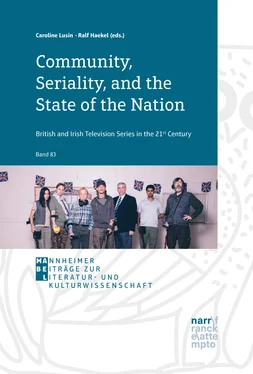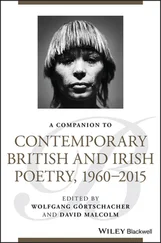1 ...7 8 9 11 12 13 ...19 The beginning of this section posed the question of how the modern individual’s striving for self-fulfilment affects the community of the family. In the end, not the Shelby family per se, but a normative family ideal the Shelby business draws on threatens to disintegrate on account of the family members’ modern tendencies towards individualisation. In other words, modernity’s “promise of autonomy and freedom” does not infringe on the community of the family, but it potentially harms the business. This business exploits a culturally conservative, idealised conception of the community of the family, which thereby becomes a farce, deconstructing the “myth of traditional community” (Delanty 39) as well as the “phantasm[] of the lost community” (Nancy 12). It is all the more interesting that the Shelby family as such rejects the normativity of such a conception. “What family” remains of the Shelbys and in how far “the family” is nonetheless “the sole remaining site of anything that might resemble normative authority” in a world void of such (Shuster 122-3) shall be discussed in what follows.
4. Peaky Blinders and the Non-Normative Community
It appears counterintuitive to argue that the Shelby family, head of a criminal empire, should be the only paradigm left in a world “emptied of normative authority” (Shuster 6) when the diegetic world of Peaky Blinders abounds with groups and institutions that claim such authority. In doing so, these organisations all draw on a particular promise of salvation, namely that of community. While the IRA ultimately resorts to the potent common bond of a desired independent Irish nation, the Communist movement promotes an international community of the ‘workers of the world’. Needless to say, the English nation, represented by the King, in whose name the First World War was fought, could be worth dying for only as a community. The church, in Peaky Blinders personified by Father Hughes (Paddy Considine), similarly provides for lost souls a community of believers. The police, finally, gain their authority to a significant degree from a deliberate mission to protect community.
The world of Peaky Blinders witnesses the consistent failure of the institutions traditionally providing orientation and guidance. In the Shelbys’ Birmingham, the police are on the payroll of the Peaky Blinders, taking orders from the gang. Tommy’s major opponent in series one and two, Chief Inspector (later Major) Chester Campbell (Sam Neill), sent from Belfast to retrieve the stolen guns and, self-appointedly and in a fit of Victorian rhetoric, to cleanse the city of its “puss of […] corruption” (S1/E1, 00:29), is an exception. Yet, his double standards thwart any pretension of moral superiority – in the course of two series, he has intercourse with prostitutes, rapes Polly (S2/E5) and willingly condones the death of his opponents. The Irish priest Father Hughes, who stars as one of Tommy’s adversaries in series three, is a busy figure of ‘The Odd Fellows’, a right-wing secret organisation with members of high social standing, and an operative of a conspiracy that licenses blackmail and murder. Moreover, Michael reveals that “when he was with the parish ”, “in the care of the holy fathers” (S3/E5, 00:53, my emphasis), he suffered under Father Hughes’ child abuse (00:02). A strategic burning of the King’s picture, bought from every household in Small Heath, illustrates the Peaky Blinders’ and population’s fading loyalty to the head of state (S1/E2, 00:12), which is further diminished by the information that upon his return from the war, Thomas “[t]hrew” the medals he won for gallantry “in the [river] Cut” (S1/E6, 00:28), as did other returned soldiers (S2/E3, 00:10). The “normative breakdown” (Shuster 6) of the above institutions is apparent. What is more, their promise of community is exposed as a fraud. The same eventually holds true for the IRA and the Communist movement, gaining momentum at a historical point in time when the processes of modernity render community an auspicious alternative. As has been shown above, such an opposition is flawed. Any recourse to community as a promise of salvation is based on the illusion of an ideal pre-modern community to be recovered. Such a community is a feeble cure, and, moreover, potentially dangerous due to the rigid normativity and potentially totalitarian scope it entails. The Peaky Blinders offer no such promise.
Admittedly, though, Thomas Shelby is stylised as a saviour. Major Campbell forcedly recruits him to work for the British government with the words: “You’ve been chosen, Mr Shelby […].” (S2/E4, 00:05) This is already conveyed by the show’s introduction. The whole sequence lacks the social realism its setting suggests because it foregoes the mode’s sense of despair and contingency. Thomas Shelby, with his detached attitude and stylish dress, is at the centre of attention, and it is he who holds this world together; all its elements relate to him. This, finally, is the reason why Peaky Blinders is not about the working class. It is about the man on whom this community relies, who, as a representative of Small Heath’s working class community, maintains it. Nick Cave and the Bad Seeds’ “Red Right Hand” in turn declares Thomas as such: “he’s a god, he’s a man/ he’s a ghost, he’s a guru”. The bartender whom Thomas has dispossessed of the Garrison aptly puts it as follows: “Everybody round here – they want you to win […] you’re bad men, but you’re our bad men […].” (S1/E6, 00:33, my emphasis) Crucially, however, Tommy’s status does not rest on the promise of anything; rather, the Peaky Blinders trade the absence of liability. Placing themselves above society’s rules like “ghost[s]”, they are founded on non-normativity.
Community, then, no longer serves as the promise of salvation. The community of the family, conflated with business, is invaded by a rationale of profit. This does not preclude the possibility of community, but it warns of the pitfalls of community exploited. What Peaky Blinders pictures instead is an open, almost paradoxical community exempt from the normativity a conceptualisation of community hardly ever escapes. Thomas is profoundly distrustful towards ‘grand narratives’ of community. When asked by Grace whether he “ha[s] sympathies” with the IRA men who purposed to buy the stolen guns, Thomas replies: “I have no sympathies of any description […].” (S1/E3, 00:05) Thomas’ alliances thus shift according to the benefits they offer, regardless of allegiance. The burning of the King’s picture is a case in point.1 Thomas does not profess loyalty to any larger community; what matters to him is the experienced community of war comradeship and his family, the latter often equated with the former.
As a community, the Shelby family resists easy classification. Tradition, replaced (or artificially erected) by business calculations, is no determinant in their case. Their identity is, in fact, under-determined; the Shelbys are defined more by what they are not than by what they are. Common identity categories do not apply. They are not part of the working class; they are not religious,2 and they are not English. The Shelby siblings lack both mother and father, and the exact origins of the Shelby family, apart from their denomination as ‘Gypsy’, remain obscure. The audience learns that on Thomas’ “mother’s side, [they] are kin” to the Romani Lee family (S1/E4, 00:12). Thomas, Polly, and the other family members furthermore speak Romani. “Their granddad was a King”, the second episode of series one reveals, “but [Thomas’] mother was a Diddicoy whore” (00:03). Of their father’s side little is known except that Arthur Shelby Senior and his sister Polly are presumably of Irish and ‘Gypsy’ origins, too; they might thus descend from Irish Travellers, although Polly speaks Romani. Polly instructs Michael in series four that his “grandmother was a Gypsy princess. Name of Birdy Boswell” (E5 00:21), which possibly relates them to Madame Boswell, a ‘Gypsy’ sage Thomas sees in Wales (S3/E3). All this renders the family a “Diddicoy razor gang” (S1/E2, 00:53), ‘diddicoy’ being a pejorative term that denotes a non-purely Romani descent (see Long 173). This intricate line of ancestry all the more defies definition of the Shelby family in terms of an essential identity.
Читать дальше












